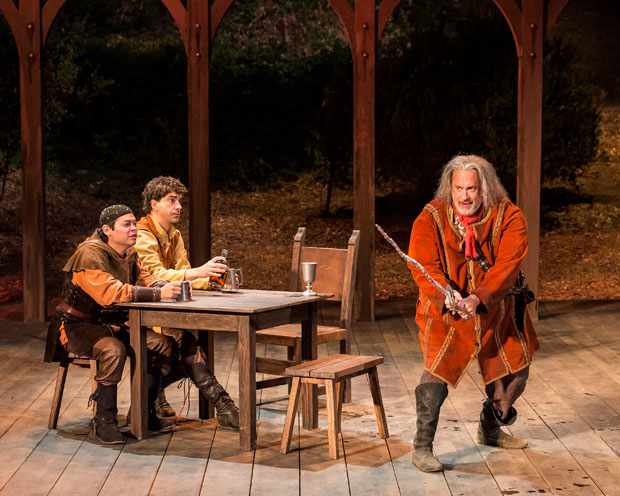Tom Hanks Tackles Falstaff in William Shakespeare's Henry IV

(© Craig Schwartz)
William Shakespeare's Henry IV focus on growth and having history thrust upon oneself whether wanted or not. For The Shakespeare Center of Los Angeles, director Daniel Sullivan has culled and combined both plays into an evening of ribaldry, song, and pageantry. Similar to Orson Welles's film adaptation of the plays, Chimes at Midnight, this revision focuses on the prince's overstuffed, thieving mentor, Falstaff, lending a perfect vehicle for Tom Hanks's humorous but poignant sensibilities.
The monarchy of King Henry IV (Joe Morton) is in upheaval. His allies, the Percy family, who aided his ascension to the throne, have now turned against him. To further his frustration, his son and heir, Prince Hal (Hamish Linklater), would rather carouse with his friends than face his responsibility as the future King of England. He drinks at the tavern and plans petty robberies with his pals, particularly the portly Falstaff (Hanks). A complete embarrassment for the king, Hal's rakish behavior spreads through the land, weakening the position of his already ailing father. As civil war breaks out among the factions, Hal must take arms and follow his father into battle, a road that will eventually lead to the crown.
Sullivan's original adaptation of the two plays allows Part 1 to introduce the characters and motivations in the evening's first act, and then Part 2 leads the evening towards a bittersweet climax where duty and friendship collide. Original music and songs by Michael Roth capture the mood of the period and the joviality of the tavern setting.
Hanks is devilish as the rapscallion who fibs even to his friends, claims success for other's deeds, and mocks even those close to him. Hanks conveys the sense that this overcompensating is all in jest, though. He toys with his friends and allows himself to be the fool, but underneath is a prideful man who is never cruel. It's important for Hanks to hint at the surrogate fatherly warmth so that Hal's betrayal at the end will sting.
The scenes with the most impact are those that touch upon universal emotions, especially of a father and son arguing over legacy and the disappointment one feels when their progeny do not meet expectations. Morton comes alive in those scenes. Hal's character arc is most vital to the play and Linklater illustrates the conflict in his character's soul. In the early scenes, you can see him working diligently at being a scalawag. In later scenes, particularly in Hal's negotiations with his rival, Henry "Hotspur" Percy, he demonstrates the humility, kindness, and diplomacy that will aid him when he eventually becomes king. Tony Award winner Rondi Reed is a firecracker as Quickly, the tavern mistress.
Many of the actors play multiple roles that allow them to revel in comic relief as well as lend credence to the bloody battle engaged. Harry Groener schemes as the Earl of Northumberland, the leader of the rebellion, but then puts on a false nose and giggles as Falstaff's compatriot Justice Shallow. Raffi Barsoumian is forceful as the vengeful rebel Hotspur, then slaps on a mustache and prances about as the slippery soldier Pistol. Emily Swallow brings intrigue as Lady Percy, a catalyst and instigator for the civil war, and then, in Act 2, dons a frizzy red wig and bounces about as the brash prostitute Doll Tearsheet.
Holly Poe Durbin's costumes, particularly Falstaff's sweat-stained jacket, illustrate the wear and tear of life during the period. One can practically smell the stench of alcohol and exertion coming from Hanks' Falstaff. Ralph Funicello's set is raked against the Japanese Garden's forest, allowing Sullivan to utilize the background's vibrant green bushes and hill, which gives the action scenes extra depth. Trevor Norton's lighting design illuminates the forest area.
Though a long evening, Sullivan keeps the pacing at a sprint. Aided by a star turn that never feels outside the rest of the cast, and a talented cast of Shakespearean players, Henry IV delights but also touches on something primal about loyalty to family, friends, and history.










